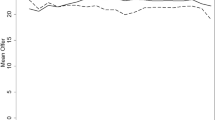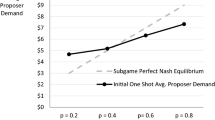Abstract
Demands in the Ultimatum Game in its traditional form with one proposer and one responder are compared with demands in an Ultimatum Game with responder competition. In this modified form one proposer faces three responders who can accept or reject the split of the pie. Initial demands in both ultimatum games are quite similar, however in the course of the experiment, demands in the ultimatum game with responder competition are significantly higher than in the traditional case with repeated random matching. Individual round-to-round changes of choices that are consistent with directional learning are the driving forces behind the differences between the two learning curves and cannot be tracked by an adjustment process in response to accumulated reinforcements. The importance of combining reinforcement and directional learning is addressed. Moreover, learning transfer between the two ultimatum games is analyzed.
Similar content being viewed by others
References
Abbink, K., Bolton, G.E., Sadrieh, A., and Tang, F.-F. (2001). “Adaptive Learning versus Punishment in Ultimatum Bargaining.” Games and Economic Behavior. 37(1), 1–25.
Barron, G. and Erev, I. (2001). “On Adaptation, Maximization, and Reinforcement Learning Among Cognitive Strategies.” Mimeo, Technion, Haifa.
Bolton, G.E. (1998). “Strong and Weak Equity Effects: Evidence, Significance and Origins.” In D. Budescu, I. E. and R. Zwick (eds.), Games and Human Behavior, Essays in Honor of Amnon Rapoport, Hillsdale, NJ.
Bolton, G.E. and Ockenfels, A. (2000). “ERC-A Theory of Equity, Reciprocity, and Competition.” American Economic Review. 90(1), 166–193.
Bolton, G.E. and Zwick, R. (1995). “Anonymity versus Punishment in Ultimatum Bargaining.” Games and Economic Behavior. 10, 95–121.
Cachon, G.P. and Camerer, C. (1996). “The Sunk Cost Fallacy, Forward Induction and Behavior in Coordination Games.” Quarterly Journal of Economics. 111, 165–194.
Camerer, C.F. and Ho, T.H. (1999). “Experience-Weighted Attraction Learning in Games: AUnifying Approach.” Econometrica. 67, 827–874.
Camerer, C.F., Ho, T.H., and Wang, X. (2002). “Individual Differences in EWA Learning with Partial Payoff Information.” Mimeo.
Cason, T. and Friedman, D. (1997). “Price Formation in Single Call Markets.” Econometrica. 65(2), 311–345.
Crawford, V.P. (1995). “Adaptive Dynamics in Coordination Games.” Econometrica. 63, 103–143.
Duffy, J. and Nagel, R. (1997). “On the Robustness of Behavior in Experimental Beauty-Contest Games.” Economic Journal. 107, 1684–1700.
Erev, I. and Rapoport, A. (1998). “Coordination, 'Magic,' and Reinforcement Learning in a Market Entry Game.” Games and Economic Behavior. 23, 146–175.
Erev, I. and Roth, A. (Unpublished). “Adaptation and Imitation in Experimental Games.” Technical Report.
Erev, I. and Roth, A.E. (1998a). “Predicting How People Play Games: Reinforcing Learning in Experimental Games with Unique, Mixed Strategy Equilibria.” American Economic Review. 88(4), 848–881.
Erev, I. and Roth, A.E. (1998b). “On the Role of Reinforcement Learning.” In D. Budescu, I.E. and R. Zwick (eds.), Games and Human Behavior, Essays in Honor of Amnon Rapoport, Hillsdale, NJ.
Fehr, E. and Schmidt, K. (1999). “A Theory of Fairness, Competition and Cooperation.” Quarterly Journal of Economics. 114, 817–868.
Gale, J., Binmore, K.G., and Samuelson, L. (1995). “Learning to be Imperfect: The Ultimatum Game.” Games and Economic Behavior. 8, 56–90.
Gick, M.L. and Holyoak, K.J. (1980). “Analogical Problem Solving.” Cognitive Psychology. 12, 306–355.
Gick, M.L. and Holyoak, K.J. (1983). “Schema Induction and Analogical Transfer.” Cognitive Psychology. 15, 1–38.
Glassnapp, D. and Poggio, J. (1985). Essentials of Statistical Analysis for the Behavioral Sciences. Columbus, OH: Merrill.
Grosskopf, B. (2001). “Merging Reinforcement and Directional Learning-A Generalized Model.” Mimeo.
Grosskopf, B., Erev, I., and Yechiam, E. (2001). “Foregone with the Wind.” Mimeo.
Güth, W., Marchand, N., and Rulliere, J.-L. (1997). “On the Reliability of Reciprocal Fairness-An Experimental Study.” Mimeo.
Güth, W., Schmittberger, R., and Schwarze, B. (1982). “An Experimental Analysis of Ultimatum Bargaining.” Journal of Economic Behavior and Organization.3, 367–388.
Ho, T., Camerer, C., and Weigelt, K. (1998). “Iterated Dominance and Iterated Best Response in Experimental p-Beauty Contests.” American Economic Review. 88(4), 947–969.
Huck, S., Normann, H.-T., and Oechssler, J. (1999). “Learning in Cournot-Oligopoly-An Experiment.” Economic Journal. 109(454), C80–95.
Kagel, J. and Levin, D. (1999). “Common Value Auctions with Insider Information.” Econometrica. 67(5), 1219–1238.
Kimble, G.A. (1961). Hilgard and Marquis' Conditioning and Learning. Englewood Cliffs, Prentice Hall.
Kuon, B. (1994). Two-person Bargaining Experiments with Incomplete Information. Springer Lecture Notes in Economics and Mathematical Systems (No. 412). Berlin, Heidelberg, New York: Springer.
Messick, D.M., Moore, D.A., and Bazerman, M.H. (1997). “Ultimatum Bargaining with a Group: Underestimating the Importance of the Decision Rule.” Organizational Behavior and Human Decision Processes. 69, 87–101.
Mitzkewitz, M. and Nagel, R. (1993). “Experimental Results on Ultimatum Games with Incomplete Information.” International Journal of Game Theory. 22, 171–198.
Mookherjee, D. and Sopher, B. (1997). “Learning and Decision Costs in Experimental Constant Sum Games.” Games and Economic Behavior. 19, 97–132.
Nagel, R. and Tang, F.F. (1998). “Experimental Results on the Centipede Game in Normal Form: An Investigation on Learning.” Journal of Mathematical Psychology. 42, 356–384.
Nagel, R. and Vriend, N. (1999). “An Experimental Study of Adaptive Behavior in an Oligopolistic Market Game.” Journal of Evolutionary Economics. 9, 27–65.
Perkins, D.N. and Salomon, G. (1988). “Teaching for Transfer.” Educational Leadership. 46, 22–32.
Roth, A. and Erev, I. (1995). “Learning in Extensive Form Games: Experimental Data and Simple Dynamic Models in the Intermediate Term.” Games and Economics Behavior. 8, 164–212.
Roth, A.E. (1995). “Bargaining Experiments.” In J. Kagel and A.E. Roth (eds.), Handbook of Experimental Economics, Princeton University Press.
Salomon, G. and Perkins, D.N. (1989). “Rocky Roads to Transfer: Rethinking Mechanisms of a Neglected Phenomenon.” Education Psychologist. 24, 113–142.
Selten, R. and Buchta, J. (1998). “Experimental Sealed Bid First Price Auction with Directly Observed Bid Functions.” In D. Budescu, I.E. and R. Zwick (eds.), Games and Human Behavior, Essays in Honor of Amnon Rapoport, Hillsdale, NJ.
Selten, R. and Stoecker, R. (1986). “End Behavior in Sequences of Finite Prisoner's Dilemma Supergames: A Learning Theory Approach.” Journal of Economic Behavior and Organization. 7(1), 47–70.
Slonim, R. and Roth, A.E. (1998). “Financial Incentives and Learning in Ultimatum and Market Games: An Experiment in the Slovak Republic.” Econometrica. 66(3), 569–596.
Author information
Authors and Affiliations
Rights and permissions
About this article
Cite this article
Grosskopf, B. Reinforcement and Directional Learning in the Ultimatum Game with Responder Competition. Experimental Economics 6, 141–158 (2003). https://doi.org/10.1023/A:1025305020751
Issue Date:
DOI: https://doi.org/10.1023/A:1025305020751




